|
|
|
Sort Order |
|
|
|
Items / Page
|
|
|
|
|
|
|
| Srl | Item |
| 1 |
ID:
085443
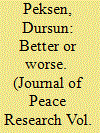

|
|
|
|
|
| Publication |
2009.
|
| Summary/Abstract |
Does economic coercion increase or decrease government respect for human rights in countries targeted with economic sanctions? If economic sanctions weaken the target regime's coercive capacity, human rights violations by the government should be less likely. If, on the contrary, sanctions fail to attenuate the coercive capacity of the target elites and create more economic difficulties and political violence among ordinary citizens, the government will likely commit more human rights violations. Focusing on competing views of why sanctions might improve or deteriorate human rights conditions, this article offers an empirical examination of the effect sanctions have on the physical integrity rights of citizens in target countries.
|
|
|
|
|
|
|
|
|
|
|
|
|
|
|
|
| 2 |
ID:
085439
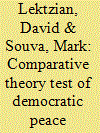

|
|
|
|
|
| Publication |
2009.
|
| Summary/Abstract |
Multiple theories posit the existence of a dyadic democratic peace. The authors extend the logic of three theories of the democratic peace - informational, normative, and preferences - and find that they make different predictions with respect to the onset and escalation of disputes across the range of similar regime dyads. First, regarding dispute onset, the preferences argument, but not the normative and informational arguments, expects autocratic dyads of similar type to have less conflict onset than mixed dyads.
|
|
|
|
|
|
|
|
|
|
|
|
|
|
|
|
| 3 |
ID:
085444


|
|
|
|
|
| Publication |
2009.
|
| Summary/Abstract |
Are violators of international human rights norms punished with lower levels of foreign aid? Despite their abstract preferences, governments often lack the incentive to punish norm violators bilaterally. Multilateral lending institutions, such as the World Bank, could fill the void if they wanted to consider human rights abuses and could bypass restrictions on evaluating the political character of recipients. This article argues that `shaming' in the United Nations Commission on Human Rights, through resolutions that explicitly criticized governments for their human rights records, provided substantive information about rights abuses and gave political cover for the World Bank and other liberal multilateral aid institutions seeking to sanction human rights violators. Statistical analyses support these theoretical claims.
|
|
|
|
|
|
|
|
|
|
|
|
|
|
|
|
| 4 |
ID:
085447
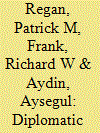

|
|
|
|
|
| Publication |
2009.
|
| Summary/Abstract |
Recent research in the civil war literature has focused on how and when external actors intervene. However, to date, systematic data have not existed on diplomatic efforts in conflict management. This article fills this gap and introduces a dataset on 438 diplomatic interventions in 68 conflicts stretching from 1945 to 1999. The authors briefly outline previous research on third-party interventions in civil wars, describe the dataset in some detail, including some initial patterns in the data, and describe how this dataset contributes to research into conflict processes.
|
|
|
|
|
|
|
|
|
|
|
|
|
|
|
|
| 5 |
ID:
085446


|
|
|
|
|
| Publication |
2009.
|
| Summary/Abstract |
Since the end of the Cold War, humanitarian interventions to provide psychological assistance to children exposed to political violence have become commonplace. Within the literature and the practices of organizations involved in interventions, there is a widespread conception that children exposed to political violence are highly vulnerable to psychological trauma. This article challenges this claim. The article examines a number of methodological weaknesses in the existing literature and associated practices, including: problems of measurement; an inadequate conception of the aetiology of children's psychological responses; and a lack of due attention to the literature on child development.
|
|
|
|
|
|
|
|
|
|
|
|
|
|
|
|
| 6 |
ID:
085441
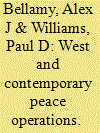

|
|
|
|
|
| Publication |
2009.
|
| Summary/Abstract |
In recent years, senior UN officials have raised concerns about the decline of Western contributions to UN peace operations. Although this is a worrying trend for supporters of the UN, it does not mean that the West is playing a smaller role in peace operations per se. Instead, the West has increased its contribution to `hybrid' peace operations and missions that take place outside of the UN system. This article examines the West's contribution to both UN and non-UN peace operations since the Brahimi Report and assesses whether its contribution has markedly changed and what impact any changes have had on international peace and security. It proceeds in three sections. The first provides a historical overview of the West's ambivalent relationship with UN peace operations since 1948.
|
|
|
|
|
|
|
|
|
|
|
|
|
|
|
|
| 7 |
ID:
085445
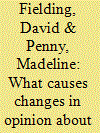

|
|
|
|
|
| Publication |
2008.
|
| Summary/Abstract |
In this article, the authors present a statistical analysis of the factors that have driven monthly variations in the aggregate level of support among Israeli Jews for the Oslo Peace Accords since the onset of the intifada. Using data from monthly opinion polls, they find that there is a stable relationship between the fraction of respondents supporting the peace process and variables capturing the current level of conflict intensity. Different dimensions of the conflict have very different effects on Jewish-Israeli public opinion, with substantial heterogeneity in the response of attitudes to conflict events on either side of the Green Line.
|
|
|
|
|
|
|
|
|
|
|
|
|
|
|
|
|
|
|
|
|